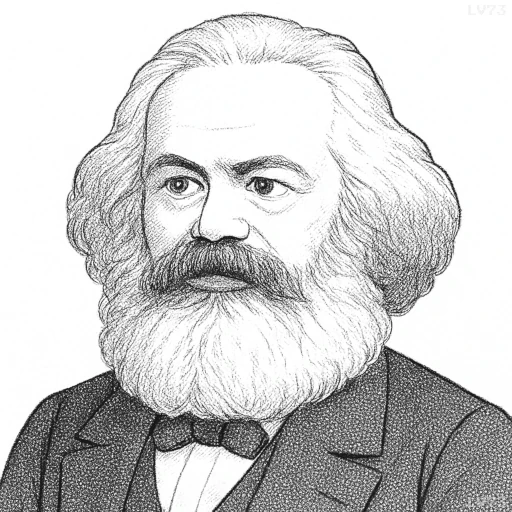“From each according to his abilities, to each according to his needs.”

- May 5, 1818 – March 14, 1883
- Born in the Kingdom of Prussia (Germany)
- Philosopher, economist, political thinker
table of contents
Quote
“From each according to his abilities, to each according to his needs.”
Explanation
This famous phrase encapsulates Marx’s vision for a just and equitable society, particularly in the final stage of communism. In this system, individuals would contribute to society based on their abilities—meaning that everyone would work according to what they are capable of or skilled at, without the constraints of exploitation or profit motives. In return, people would receive from society based on their needs, ensuring that everyone’s essential requirements—such as food, housing, education, and healthcare—are met, regardless of their social or economic status. This principle contrasts sharply with capitalist systems, where distribution is based on market value and individual wealth rather than actual human need. Marx’s goal was to create a society in which everyone has access to what they need for a fulfilling life, and the focus is on human welfare rather than profit.
Historically, Marx argued that capitalism inherently leads to inequality because wealth is distributed according to the amount of capital one possesses, not according to the needs of individuals. Under capitalism, the working class produces the value through their labor, but much of that value is appropriated by the capitalist class, leaving workers unable to meet their basic needs despite contributing to the economy. Marx’s ideal of a classless society would allow the abolition of private property and the redistribution of resources, so that all people have access to what they need for a dignified life. This quote reflects Marx’s belief that a truly humane society can only be achieved when the economy prioritizes the well-being of all its members, rather than the accumulation of wealth by a few.
In modern contexts, this phrase continues to resonate in discussions about economic inequality, social justice, and redistribution of wealth. For example, the idea of universal basic income (UBI) or the push for universal healthcare is rooted in the notion that society should meet the needs of its people. In capitalist economies, wealth distribution is often determined by market forces, leading to vast disparities between rich and poor. Marx’s principle offers a critique of these systems, proposing an alternative where needs-based distribution ensures that no one is left behind due to their inability to participate in the competitive market. While achieving this vision remains a challenging goal, the idea of meeting basic human needs as a fundamental right continues to inspire social movements aimed at creating a more just and equitable world.
Would you like to share your impressions or related stories about this quote in the comments section?
